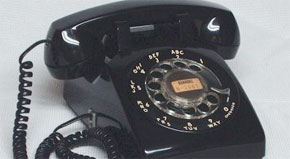State Gives Up Oversight On Your Landline Phone As Wireless World Grows
July 27, 2011
The state’s utility watchdog on Tuesday continued the inevitable march toward a wireless world by relinquishing much of its authority over traditional landline telephone service.
Responding to legislation passed earlier this year, the Florida Public Service Commission on Tuesday, without discussion, withdrew a number of regulations targeting traditional wired communication services, a move sought by companies like AT&T and other landline providers that face increasing competition from cable and wireless providers.
 The bill removed the PSC’s regulatory oversight of basic local telecommunications service and additional services and price regulation. The bill also removed the agency’s oversight of intrastate interexchange services, operator services, and shared tenant services.
The bill removed the PSC’s regulatory oversight of basic local telecommunications service and additional services and price regulation. The bill also removed the agency’s oversight of intrastate interexchange services, operator services, and shared tenant services.
“By embracing the regulatory reform approved by our Legislature and governor, we expand customer choice, allow pricing flexibility, and spur market expansion for Florida’s economic and technological growth,” PSC Chairman Art Graham, said in a statement.
The move away from telecommunication regulation has been a long steady migration since 1995, when lawmakers first opened up local markets to competition.
The PSC is scheduled to come out with its annual telecommunications report that among other things lists the number of landline customers, a group increasingly dominated by older Floridians.
Charles Millstead, associate state director for AARP, said the organization is asking members to keep track of telephone bills in the months to come to see if fees or charges go up unexpectedly.
“There is very little to do right now,” Millstead said. “We’ve asked our members to look at their telephone bills.”
Tuesday’s vote is the latest chapter in a long-standing effort by landline companies to compete in an increasingly wireless world. The number of landline customers have dropped dramatically over the years, plummeting 38 percent between 2001 and the end of 2009.
In 2010, longstanding carriers such as AT&T, Verizon and CenturyLink, saw a 20 percent drop in residential and business “access” lines, an industry measurement of the wire line market.
As of June 30, 2010, about 16.9 million wireless handsets were in use in Florida — nearly one for each person in the state. About 27 percent of Florida adults lived in wireless-only households during the year-long period ending June 30, 2010, up 22.9 percent from the previous year.
Traditional telecommunication companies are also getting increased competition from cable television companies that are now allowed to provide voice over Internet services.
“Consumers are making choices that utilize new and innovative technologies that were not even dreamed of when most of the current laws were put into effect,” said AT&T spokeswoman Stephanie Smith. “Florida’s telecommunications laws now reflect the reality of the current competitive marketplace.”
An updated report is scheduled to be released in August. Though it won’t show the impact of the deregulation bill, Millstead said it will act as a baseline for future comparison.
“We will certainly keep a copy of that and compare a year from now,” he said.
By Michael Peltier
The News Service of Florida



Comments